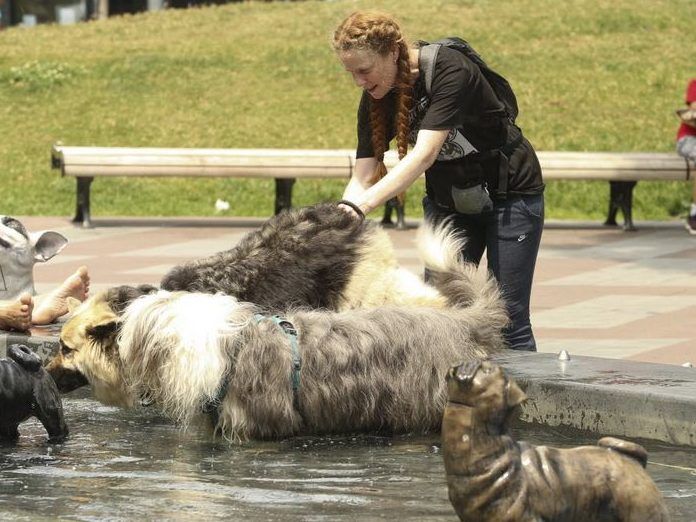Better than getting colder .Canada will face 'lethal heat' in a few decades, says Study
Author of the article:Liz Braun
Publishing date:May 15, 2022 • 13 hours ago • 3 minute read • 109 Comments
Canada is hot and getting hotter.
Lethal heat will be a reality within 30 years.
Irreversible Extreme Heat: Protecting Canadians and Communities from a Lethal Future, from geoscientist Joanna Eyquem and Blair Feltmate, is a new study from the Intact Centre on Climate Adaptation (a research facility at the University of Waterloo) that projects a roasty future in Canadian cities as temperatures continue to rise.
Cities are the focus because urban areas are the hotspots of global warming, as they’re hotter than surrounding countryside, with heat trapped and reflected by roads, paved areas and other surfaces.
This is the urban-heat-island effect.
The extreme heat coming our way carries with it concurrent threats of flooding, wildfires and other natural disasters already happening in Canada.
Canada is warming (on average) at twice the global rate, researchers state.
As always, some Canadians will be more vulnerable than others: the elderly, the economically disadvantaged, those who labour outdoors and people who already have health issues.
The researchers are quite specific about areas at risk: “Low-lying areas from the West Coast to the Rocky Mountains (British Columbia), the Prairies bordering the United States (southern Alberta, Saskatchewan, and Manitoba) and north of Lake Erie through the St. Lawrence River Valley (southern Ontario and Quebec).”
The study states that widespread death will result if an extreme heat event and a lengthy power outage happen at the same time; being prepared for this type of weather emergency has become crucial.
Everyone has to take steps now to reduce personal and community risk from extreme heat.
The study provides a detailed list of actions individuals, building owners and communities can take to protect one another.
From installation of heat-reducing windows and shading devices (such as shutters or awnings) to planting more trees and making an emergency plan with neighbours, there are plenty of things individuals can do.
On the community level, cooling centres, reduction of vehicle traffic and local support programs are among the suggested solutions.
Extreme heat is already causing premature deaths in Canada. During a heat wave last summer in British Columbia, 526 people died as a result of extreme heat in the last five days of June.
Much of Canada will experience extreme temperatures in the years 2051–2080. The report looks at three indicators: very hot days (over 30C), warmest maximum temperature and heat wave duration.
Toronto can expect very hot days — over 30C — to increase from a dozen each summer to more than 50 by 2051.
The further south you go in Ontario, the worse it gets, with Hamilton and the Niagara region sweltering in life-threatening temperatures, and Windsor set to be on the receiving end of almost 80 days a year of temperatures higher than 30C.
And by higher, scientists predict heat in the range of 38C in the second half of the century. In places such as Kelowna, B.C. and Regina, temperatures of 40C will not be out of the ordinary.
The current trajectory will see Toronto experience heat waves that stretch on for more than a week.
Extreme heat affects every element of life, creating electrical problems, damaging infrastructure, reducing insect and bird populations, affecting water quality and putting tremendous pressure on human health and health-care services.
To avoid all of this getting worse, action is required now.
In Toronto, there are community action groups you can join.
The research study mentions CREW — Community Resilience to Extreme Weather — a group with strategies to protect neighbours and be prepared with an emergency plan.
Meanwhile, Irreversible Extreme Heat: Protecting Canadians and Communities from a Lethal Future should be required reading.

Community Resilience to Extreme Weather (CREW) - CREW Toronto
CREW in St James Town CREW has been building leadership capacity and volunteer teams in this exceptionally diverse neighbourhood since 2016. CREW brings people together in workshops, training sessions, door to door outreach, asset mapping, lobby greeting tables, community events, gardening...crewresilience.ca

Canada will face 'lethal heat' in a few decades, study says
Canada is hot and getting hotter.torontosun.com
It's Climate Change I tell'ya!! IT'S CLIMATE CHANGE!!
- Thread starter B00Mer
- Start date
You are using an out of date browser. It may not display this or other websites correctly.
You should upgrade or use an alternative browser.
You should upgrade or use an alternative browser.
How is March 2022 2.0 coming along? Floods yet?Better than getting colder .
Lots of rain , it seems like 40 days , but not much flooding , soggy golf courses .How is March 2022 2.0 coming along? Floods yet?
It is going to be the hottest year EvanYou can always come back .
Snow at 1100m tonight for the Island, south coast. 70mm rain with 70km winds.It is going to be the hottest year Evan
Yeesh, March 2.0 was being generous.Thats Feb shit.
I'm happy in Las Reina.
Last week it was still snowing in Fernie . And over the mountain passes .Snow at 1100m tonight for the Island, south coast. 70mm rain with 70km winds.
Yeesh, March 2.0 was being generous.Thats Feb shit.
I'm happy in Las Reina.
Food shortages from Ukraine, India and now Southern USA
Even thousands more dead in Nebraska. Looks like a meat shortage is coming, in addition to the wheat shortage. You will eat the bugs. You will own nothing. You will be happy.
Even thousands more dead in Nebraska. Looks like a meat shortage is coming, in addition to the wheat shortage. You will eat the bugs. You will own nothing. You will be happy.
I truly hope you all took my advice and purchased food backup for at least a good year.
OH and Toilet Paper.. no joke
Get a freezer in the basement..
OH and Toilet Paper.. no joke
Get a freezer in the basement..
Freezer? Get a woodstove in the basement. Freezer goes in the garage and doesn't need electricity through winter.I truly hope you all took my advice and purchased food backup for at least a good year.
OH and Toilet Paper.. no joke
Get a freezer in the basement..
I don’t know about anybody else but my insurance greatly frowns upon wood-burning stove or fireplace in the house.
I know two different people who are family members who deleted either a fireplace or a wood-burning stove just due to the difference in the insurance rates…
I had a wood furnace in my house, but when I bought it I disconnected it for the lower insurance.
But with oil being so goddamn expensive, I'll just use electric and heat water on the stove since in the end it's cheaper than either.
Do you have time to grow Oats in SK? It's already a pretty short growing season there and you now have lost 2 months.Hailed out yet again....
Scrap it or reseed with oats?
What is your opinion?

